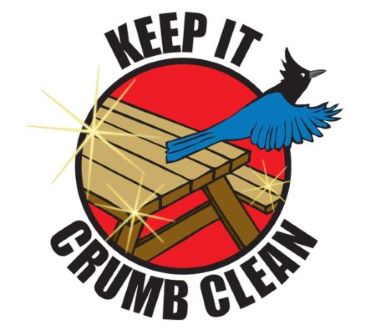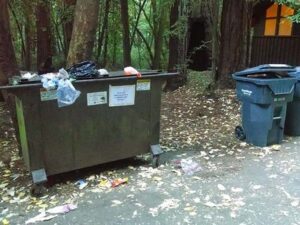A recent study, "Birdwatching linked to increased psychological well-being on college campuses: A pilot-scale experimental…

 When I first heard the term “Crumb Clean,” I thought someone was making a polite suggestion after I ravished that last piece of blueberry lemon loaf. Turns out it was the name of a promising campaign that will help protect some of our most vulnerable birds on the Oregon coast, specifically Marbled Murrelets and Snowy Plovers. These birds have experienced dramatic population declines due to loss of habitat and foraging issues caused by climate change. Nesting success is essential if their populations are to recover, but their nests are subject to high rates of predation, especially by corvids and, in some cases, gulls. The Crumb Clean Campaign aims to do something about that.
When I first heard the term “Crumb Clean,” I thought someone was making a polite suggestion after I ravished that last piece of blueberry lemon loaf. Turns out it was the name of a promising campaign that will help protect some of our most vulnerable birds on the Oregon coast, specifically Marbled Murrelets and Snowy Plovers. These birds have experienced dramatic population declines due to loss of habitat and foraging issues caused by climate change. Nesting success is essential if their populations are to recover, but their nests are subject to high rates of predation, especially by corvids and, in some cases, gulls. The Crumb Clean Campaign aims to do something about that.
 Marbled Murrelets (affectionately nicknamed “flying footballs”) have a unique way of life. They forage in the ocean, feeding on small fish such as herring and anchovies, and on zooplankton such as krill. In the spring and summer, they fly inland to make their nests on the high, mossy horizontal limbs of large, mature trees in the coastal forest. This is one of many reasons to conserve mature and old growth forests. The parents take turns with one partner sitting on the nest for a day while the other returns to the ocean to forage. They may travel up to 50 miles inland to their nesting site and do so on relatively short wings, which must continuously flap to power their flight.
Marbled Murrelets (affectionately nicknamed “flying footballs”) have a unique way of life. They forage in the ocean, feeding on small fish such as herring and anchovies, and on zooplankton such as krill. In the spring and summer, they fly inland to make their nests on the high, mossy horizontal limbs of large, mature trees in the coastal forest. This is one of many reasons to conserve mature and old growth forests. The parents take turns with one partner sitting on the nest for a day while the other returns to the ocean to forage. They may travel up to 50 miles inland to their nesting site and do so on relatively short wings, which must continuously flap to power their flight.
This is all energetically costly. They lay only one egg at a time and evidence suggests that they don’t nest every year. A five-year study in Oregon followed 300 birds and found that just under 13% of them nested. Of those that did, the successful fledging of a chick was only about 30%. Once the chicks hatch, both parents bring food back to the nest; but the chick is left mostly unattended, making it more vulnerable to predation. Predation on eggs or young chicks was the cause of unsuccessful nesting attempts for the majority of pairs. The most common predators are corvids: crows, ravens, and jays.
You won’t ever hear me dissing corvids. They are incredibly clever birds with interesting social behavior. It is natural for them to occasionally include eggs and young chicks in their diet. What is not natural is the fact that we attract these predators to recreation areas in very high numbers, close to the nesting grounds of Marbled Murrelets. Discarded food and other trash lure crows, ravens, and jays to gather and hang around in places where they would normally be scarce. We encourage people to enjoy birding and camping out at the coast, and now we have a program that can help alleviate this problem.
The Crumb Clean campaign educates people about cleaning up their food waste and not leaving food where animals can reach it. It instructs how to wash dishes so that food residue is not left to attract the birds, and it helps set up dishwashing stations. It ensures that there are garbage bins with animal-proof lids. The California Clean Crumb Campaign has been in effect since 2013 and was shown to have decreased the numbers of Stellar’s Jays in recreation areas where the plan was in place. Now, with the help of the American Bird Conservancy, the program is coming to Oregon. They’ll start by assessing busy recreation areas and surveying for corvids to prepare for implementing the campaign.
When you are out birding and enjoying other activities in beautiful coastal areas, stay “Crumb Clean” and alert a park manager or campground host if you see an issue. Consider sharing this information with other visitors to campgrounds and busy picnic sites on the coast. We need to get the word out.



